HBsAg blood test for infectious invasion of the body is a laboratory method for examining capillary or venous blood of a person, which allows you to confirm or deny infection with the hepatitis B virus
This is a particularly dangerous disease that can proceed in an acute or chronic form, gradually destroying the liver tissue, causing cirrhosis and cancerous tumors of this organ.
Record content:
- 1 What is HBsAg?
- 2 Why is an HBsAg test scheduled?
- 3 Preparation for analysis
-
4 Blood testing
- 4.1 Express diagnostics
- 4.2 Serological laboratory diagnostics
- 5 Testing during pregnancy
- 6 How much is the test done?
-
7 Decoding indicators
- 7.1 Negative result
- 7.2 Positive result
- 8 Reasons for a false positive result
- 9 What to do if viruses are found in the blood?
- 10 Video about the analysis for hepatitis
What is HBsAg?
HBsAg is a special protein compound that is the surface coat of the hepatitis B viral microorganisms. This medical term is also referred to as "Australian antigen". In most cases, the presence of the HBsAg protein coat is detected in the patient's blood as early as 6 or 8 weeks from the moment of infection with the causative agent of hepatitis B.
The determination of this antigen is carried out in a biochemical laboratory equipped with special medical equipment that allows for microbiological and serological analyzes. The patient's venous or capillary blood is used as a biological material.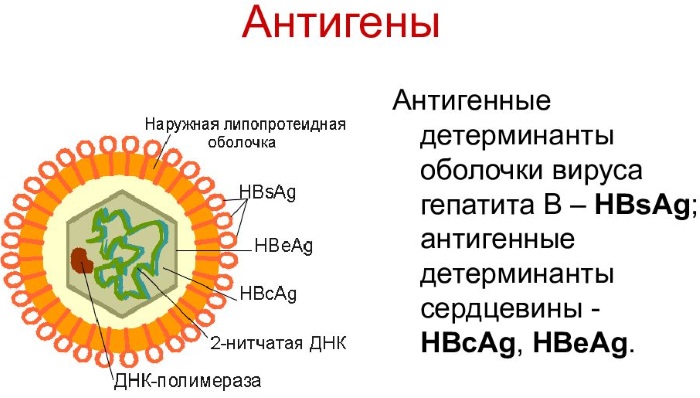
The HBsAg antigen is the most objective and informative marker for early diagnosis of hepatitis B virus infection. Detection of this protein, which is part of a pathogenic microorganism, allows you to control the epidemiological situation among large segments of the population, to prevent the rapid spread of the disease through donated blood.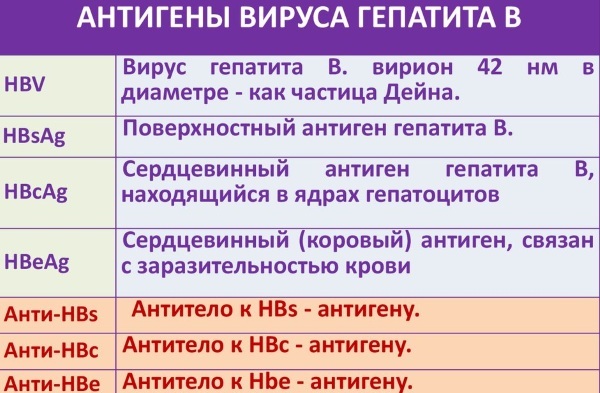
Detection of HBsAg indicates that a person contracted hepatitis B within the last 6 months., and the disease itself is at the stage of the incubation period, or it proceeds in an acute form.
The preservation of this antigen in the blood for more than six months from the moment of diagnosis indicates that the painful state of the liver has acquired a chronic process.
Why is an HBsAg test scheduled?
HBsAg blood test is a modern method for diagnosing capillary and venous blood for the presence in their composition of signs of viral microorganisms that are the causative agents of hepatitis B. The test for this antigen is carried out for the purpose of a comprehensive examination of the patient, or a preventive study of biological material.
Diagnostics for the presence of HBsAg in the blood is prescribed in the following cases:
- chronic diseases of the liver tissue or biliary tract, the nature of the origin of which was not established based on the results of the initial examination;
- a preliminary blood test showed an excess of ALT and ASAT indicators;
- the patient has external signs of viral hepatitis infection, and the sounded symptoms indicate the development of an acute form of liver disease;
- in a closed social group or among members of one family, an outbreak of the hepatitis B virus was recorded (in this case, the HBsAg test is assigned to all people who have come into contact with the infected, since they are in a group of increased risk);
- there is a preventive need for periodic examination of people with chronic pathologies of other organs in need of carrying out regular parenteral manipulations (patients with chronic renal or hepatic insufficiency, hematological diseases);
- preparation of the patient for surgery (the patient's body is checked not only for HBsAg, but also for the possible presence of other infectious agents);
- microbiological examination of blood in patients who are invited as donors;
- prevention of morbidity among health care workers working with patients who are carriers of the HBsAg antigen;
- comprehensive diagnostics of people who are undergoing the stage of treatment or rehabilitation after intravenous drug use funds (a blood test is performed in the laboratory of a narcological dispensary before hospitalization of patients of this categories);
- initial examination of women in a state of pregnancy, as well as their registration with an obstetrician-gynecologist, who will further monitor the development of the fetus.
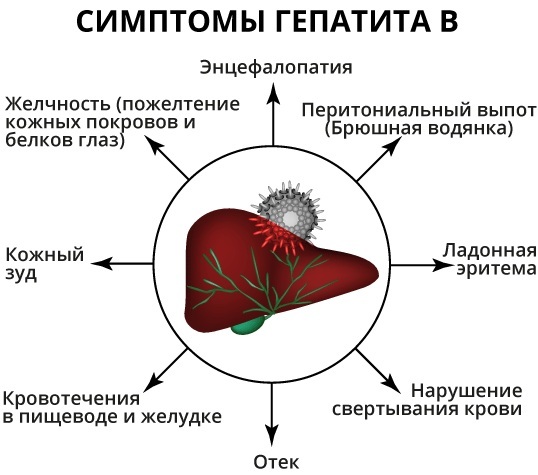
Hepatitis B symptoms
Blood donation for HBsAg is prescribed for persons who are sexually promiscuous, have intimate relationships with several sexual partners, do not use barrier contraception.
Preparation for analysis
HBsAg blood test is a laboratory diagnostic method that requires the patient to perform a number of preparatory measures.
In order for the results of a blood test to be objective, the following rules must be observed:
- on the day of donating blood, do not have breakfast, but visit the biochemical laboratory on an empty stomach;
- to come to collect biological material at a strictly specified time, since blood intake for this analysis is carried out only until 11-00 o'clock;
- the day before the scheduled study, fatty foods should be completely excluded from the diet, the presence of which can create an additional load on the liver tissue;
- the last meal should take place no later than 8 hours before the scheduled blood collection time;
- in the evening before the day of the scheduled study, you should not overeat (dinner should be light and lean);
- 3 days before the examination, it is necessary to completely exclude the use of alcoholic beverages;
- in 15 minutes before collecting biological material, it is allowed to drink 150-200 ml of drinking water without gases.
Due to the fact that for laboratory testing for HBsAg, venous blood is most often used, and its delivery is carried out on an empty stomach, you should take with you some cookies, chocolate, a sandwich or other products for snack. They can be consumed immediately after collecting blood.
This will help avoid dizziness caused by a mild drop in blood pressure or blood glucose.
Blood testing
HBsAg blood test is one of the early detection methods for hepatitis B. Examination of the body can be carried out using express diagnostics or serological examination of venous blood, which is performed by qualified personnel in a biochemical laboratories.
Express diagnostics
The advantage of express diagnostics of hepatitis B is that this research method allows you to obtain the result of a possible infection of the body with viral infections within a few minutes after the delivery of the biological material. In this case, the patient's capillary blood is used, which is collected from the bundles of the ring finger.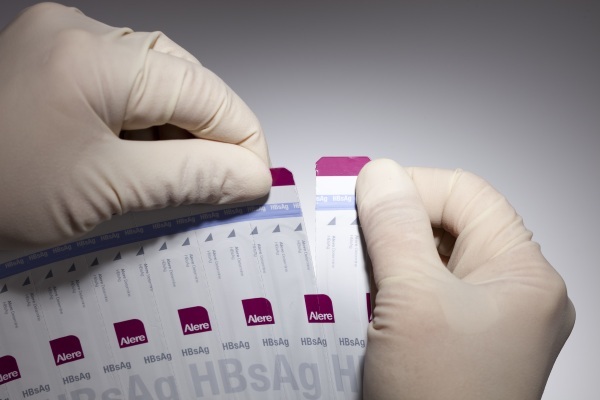
To obtain an objective result, you will need to apply 1-2 drops of biological material directly to the surface of the diagnostic strip of the immunochromatographic test. After that, you should wait 10 to 15 minutes. This time is enough for the reagents contained in the medical test to confirm or deny the presence of HBsAg antigen.
In the event that a person is sick with hepatitis B and is a carrier of a viral infection of this type, then 2 purple stripes will appear on the express test. A similar result indicates a positive response to HBsAg. In patients with no disease and clean blood without signs of the presence of hepatitis B surface antigen, 1 strip should appear in the control zone.
This is a negative test result. The complete absence of a reaction on the test for express diagnostics suggests that it is necessary to re-examine the capillary blood.
Patients who have found a positive test result are shown a deeper study of venous blood. Express diagnostics is carried out in a laboratory that provides this kind of services.
Also, this study of capillary blood can be performed independently at home, but at the same time, observing the rules of sterility. You can buy a rapid test to determine the HBsAg antigen at your pharmacy.
This does not require the presentation of a special prescription from the attending physician. The average cost of test strips ranges from 740 to 800 rubles. depending on the manufacturer.
Serological laboratory diagnostics
HBsAg blood test is a modern method for the rapid diagnosis of hepatitis B virus infection. To obtain more objective and reliable information about the infection of the body with this disease, a serological study is used, which is carried out in a biochemical laboratory.
This type of diagnostics is performed as follows:
- Venous blood is taken from the patient's cubital vein.
- The collected biological material is immediately transferred for research, or it is placed in a sterile storage cabinet at a temperature of +2 to +8 degrees Celsius.
- In the process of laboratory diagnostics, the protein structure of the surface antigen, which is characteristic of HBsAg, is identified.
- If signs of hepatitis B infection are found, the test result is recognized as positive.
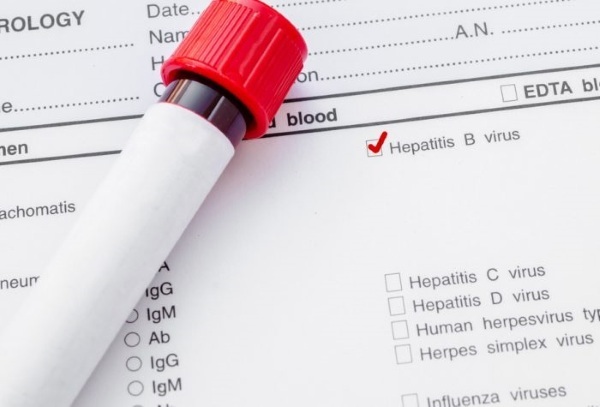
The absence of HBsAg indicators indicates a negative diagnostic result. Patients, in whose venous blood traces of surface antigens were found, are assigned a second delivery of biological material. This is necessary in order to finally confirm the infectious invasion of the body, or to refute the fact of infection with hepatitis B.
Testing during pregnancy
Pregnant women undergo a venous blood test for HBsAg values before registering with an obstetrician-gynecologist. This study is necessary for the timely diagnosis of hepatitis B, as well as the initiation of intensive treatment immediately after the birth of the child.
A blood test for HBsAg can be performed using express diagnostics or using a serological method. The study of biological material is carried out under sterile conditions in a biochemical laboratory.
In public health institutions, blood tests for HBsAg are free of charge. In private clinics, the average cost of a venous blood test ranges from 730 to 950 rubles. depending on the price policy of the medical center management.
A repeated blood test for hepatitis B surface antigen is given in the 3rd trimester of pregnancy. Also, the woman's body is checked for the possible presence of other viral and bacterial infections.
How much is the test done?
The duration of a laboratory blood test for HBsAg antigen depends on which type of diagnosis was used in a particular clinical case. If the laboratory method of analysis was used, then the results of the examination are known after 1-2 days, depending on the material and technical base of the institution that carried out the isolation of surface antigen from the composition of the venous blood.
You can pick up the diagnostic results yourself by visiting the clinic in person, or you can get a ready-made conclusion to your e-mail address. In state-owned medical institutions, where there is no modern equipment, the analysis time can take up to 7 days.
The study of capillary blood using disposable strips of express testing takes no more than 10-15 minutes. After the specified period of time, a person already knows about the presence or absence of HBsAg surface antigens in his body, which are a marker of hepatitis B virus infection.
The main advantage of this diagnostic method is the speed of its implementation., but at the same time there is a large error in its information content. Upon receiving a positive or negative test result, doctors recommend that patients undergo additional examination by donating venous blood in a biochemical laboratory.
Decoding indicators
Deciphering the test results for HBsAg indicators should be dealt with by the attending physician who ordered this blood test. 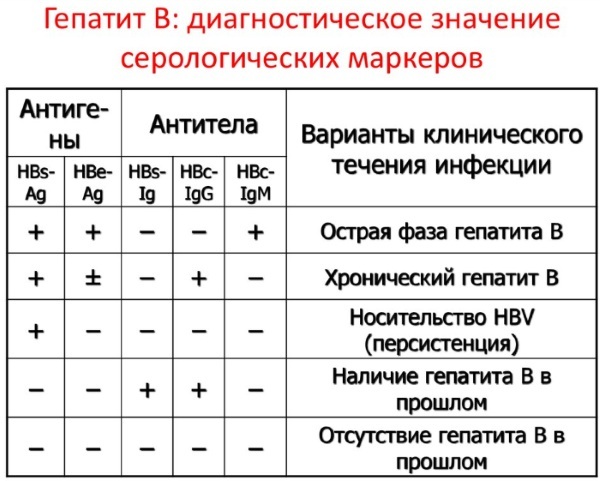 Patients who have undergone an examination of the body for infection with the hepatitis B virus receive a laboratory report with a positive or negative result.
Patients who have undergone an examination of the body for infection with the hepatitis B virus receive a laboratory report with a positive or negative result.
Negative result
The official unit of measure for hepatitis B virus surface antigens is the international unit per ml of capillary or venous blood (IU / ml). If the laboratory report of the analysis of the patient's biological material indicates that HBsAg is completely are absent, or their quantitative index does not exceed the level of 0.05 IU / ml, then the result is considered negative.
For people who have not previously been diagnosed with hepatitis B virus infection, such a conclusion indicates that their body is completely healthy, and that infectious invasion by a pathogenic microorganism has not previously occurred.
Patients who have already been infected with hepatitis B, underwent a long course of drug therapy, passed a venous blood test and received a similar result, can count on remission. HBsAg values below 0.05 IU / ml indicate the end of the acute stage of the disease with the beginning of the recovery stage of the body.
Upon receipt of such results, it is recommended to undergo a second examination by donating venous blood after 7-10 days. This is a control laboratory study that will confirm the fact of cleansing the blood and liver tissues from hepatitis B virions, and not the transition of the disease into a latent form.
Positive result
The result of a blood test for HBsAg is considered positive if, according to the results of a laboratory test, more than 0.05 IU per 1 ml of blood was found.
If the examination was carried out independently using an express test, then this is a reason for contacting an infectious disease doctor or hepatologist. You will need to undergo an additional examination, during which a comparative analysis is carried out with the results of the primary study.
In most cases, the presence of an elevated HBsAg level indicates infection with the hepatitis B virus with the course of the disease in an acute or chronic form.
After confirming the diagnosis with the help of a control analysis of venous blood, the patient is prescribed an individual treatment regimen, which will suppress the pathogenic activity of viral microorganisms, as well as maintain the functionality of the liver tissue.
The patient is registered with an infectious disease doctor at his place of permanent residence, where he is obliged to undergo further treatment.
Reasons for a false positive result
In medical practice, there are occasional cases when a rapid surface antigen test shows a positive result, and a control study of venous blood in a laboratory, refutes the primary data. There are a large number of factors, the influence of which can lead to the receipt of distorted information.
The following are the most common causes of a false positive for HBsAg:
- alcohol abuse, which lasted for a long period of time, up to the appointed date of blood donation;

Alcohol can cause false positive HBsAg blood test results - an autoimmune reaction of the body;
- increased physical activity and fatigue, which persisted at the time of delivery of the biological material;
- non-compliance with the rules of preparation for the study for HBsAg;
- eating food, which contained a large amount of animal and vegetable fats;
- the presence of concomitant liver diseases that disrupt the functionality of its tissues, but do not have a viral etiology;
- taking medications, a side effect of which is a decrease in the efficiency of the liver.
A false positive result for the surface antigen of the hepatitis B virus requires mandatory verification by retesting. After the absence of the disease is confirmed, the control analysis is submitted again, but after 6 months. The object of the study is venous blood. The express test is not used due to the large error in the results.
What to do if viruses are found in the blood?
Patients who have been found to have high titers of HBsAg surface antigen should seek medical help from an infectious disease doctor or hepatologist as soon as possible. If there is no doctor of this specialization at the place of residence of the sick doctor, then you should visit a therapist.
The general practitioner will examine the patient and write a referral to a specialized institution whose staff are engaged in the diagnosis and treatment of diseases in this category. In the absence of an acute form of hepatitis B, the patient can receive outpatient treatment. Patients with severe symptoms are admitted to the hospital.
Patients with acute hepatitis B do not need medical treatment with potent drugs. The therapy is based on drugs that improve the general well-being of the patient.
The table below lists the categories of drugs that are prescribed for acute hepatitis B:
| Drug categories | Purpose of medicines |
| Antipyretic | They are used in relation to patients with hepatitis B to reduce high body temperature, eliminate chills and fever. |
| Replenishing water-salt balance | Medicines in this group are used to prevent dehydration caused by prolonged diarrhea and vomiting. |
| Sorbents | Sorbent preparations can reduce the intoxication effect provoked by a temporary decrease in liver function. |
| Vitamins and minerals | Regular intake of vitamin and mineral agents improves the protective functions of the immune system, increasing the body's resistance to the hepatitis B virus. |
The type of drugs, the dosage regimen and the duration of treatment are determined by the infectious disease doctor on an individual basis, depending on the symptoms of the disease and the functional state of the liver. Chronic hepatitis B is treated with the antiviral drugs Tenofovir or Entecavir.
These are medicines that suppress the pathogenic activity of pathogens, preventing their harmful effects on liver tissue. These medicines are taken 1 tablet per day. The terms of treatment are not limited by time and are set by the doctor.
A blood test for HBsAg indicators is performed for early diagnosis of infection of the body with the hepatitis B virus. This is an informative method for examining capillary and venous blood, which is performed using individual express tests or serological examination method in sterile biochemical conditions laboratories.
A positive result indicates that the body is infected with the hepatitis B virus. A negative test result indicates a complete absence of infection. Minimal HBsAg titers may indicate the transition of the disease to a chronic form of the course.
Video about the analysis for hepatitis
Analysis for hepatitis B:



